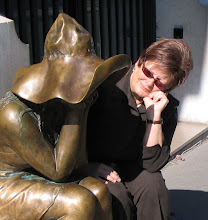
One of the good things my parents did for their family of four small children was to withhold getting a TV even when it was readily available. They wanted us to learn to read for recreation.
Now, withholding a television does not in itself create good readers. The real blessing in what they did was sitting with us lined up on the sofa every evening before bed, reading to us. Long before we were school age and could read for ourselves, we knew all about Winnie the Pooh and the House at Pooh Corner, Junket, Dr. Doolittle (the real one, not the movie versions) and we knew how Mary Poppins dusted the stars at night.
The chapter books had some pictures but not a lot, yet we saw with our minds and imaginations. We knew when Dad and Mom laughed and looked at each other that there was more to it than what met the eye. “What's so funny?”, we would ask, and set them off again. Jip the dog and the Push-Me-Pull-You became our friends. “It's a blustery day”, we would say like Pooh. “Oh, bother.”
Besides books, we listened to the radio on Saturday mornings. There was "The Howdy Doody Show", and "Les Paul and Mary Ford". One children's story had a line that was oft repeated at our house, “Woe betide you, Molly Woppy”. I still say every once in a while going up the stairs, “Fee, fie, fo, fum. I smell the blood of an Englishman. Be he alive or be he dead, I'll grind his bones to make my bread,” from Jack and the Beanstalk. The chant fits perfectly with the stair climb and is very useful for getting little children into bed and under the covers!
We played records and had most of The Court Jester (Danny Kaye) memorized. We laughed and laughed over his vessel with the pestle and the palace with the chalice and the brew that is true. We also inadvertently memorized the sound track from the Broadway play, Music Man. “Oh, we've got trouble, big, big trouble. Right here in River City.” Marian set the standard for a well-behaved young woman who wouldn't fall for “a common masher. Now, really, Mama, I have my standards where men are concerned.” “I know all about your standards”, says Mama, “and if you don't mind me sayin' so, there's not a man alive who can hope to measure up to that blend of Paul Bunyan, Saint Pat, and Noah Webster and with your Irish imagination you are as stubborn as any library full of books!” One of us could start a line and the rest of us would pick it up and go with it indefinitely, even before we knew what some of it meant.
From our Childcraft series (14 volumes, published by the Quarrie Corporation, Chicago, 1947) Mom and Dad read a wide variety of literature: The Pied Piper (rather frightening, really), Hiawatha (my little brother could recite it), Paul Revere's Ride, and of course nature stories, animal stories, and tales from other lands. My elder sister was given the Childcraft books but when she moved across country recently she gave them to me. Opening them, the strangely familiar borders and drawings whisks me back in time.
These books on our shelves were the staple, but every week or two we went to our neighborhood library to load up on our bedtime story books. I remember one Saturday morning when the books were due back and we hadn't finished the chapter book we all piled on Mom and Dad's bed and read until it was done. I remember when my sister was deemed old enough to read Caddie Woodlawn; it became a rite of passage to me.
I believe my world view was partly formed at an early age by hearing stories of other lands and customs, children who lived in sampans in China or huts in India. Along with the Bible stories we knew we learned, “Red and yellow, black and white: all are precious in His sight.”
It's not that we never saw TV. It was not verboten; we just didn't have one. At our friends' homes we could watch The Lone Ranger and learned to love Roy Rogers, Dale Evans, and Nellie Belle. One night our whole family drove to a friends' to see the Billy Graham Crusade on TV. And, when we visited at our grandparents in the summertime we could see “Art Linkletter” with Grandma or “Perry Mason” with Mom.
But none of us can win at Trivial Pursuit if it asks about television in the 50's or 60's.
My parents got a TV for themselves the Christmas I was 21.
I have a tendency to be addicted to TV nowdays. (I wish I weren't: I do try to be disciplined.)
I have heard that you don't want what you grow up without, that going without something makes one disciplined later in its use. I have also heard that absence makes the heart grow fonder, that we crave what we "missed". I don't know which is true or how the absence of TV in our childhood affects us now as adults, if we would be more or less interested in TV viewing. All I am saying is that I think the family time it gave us together reading, learning to love words and cadence and expression and good humor was a lifelong blessing.





































